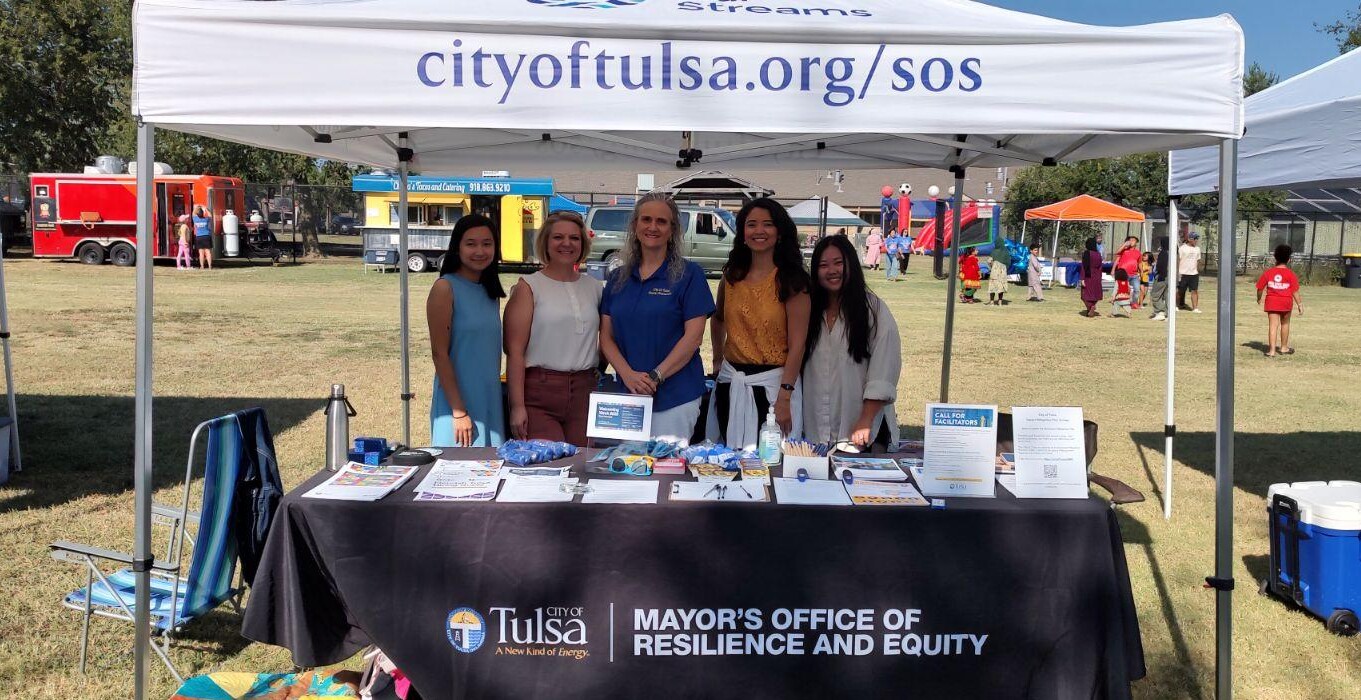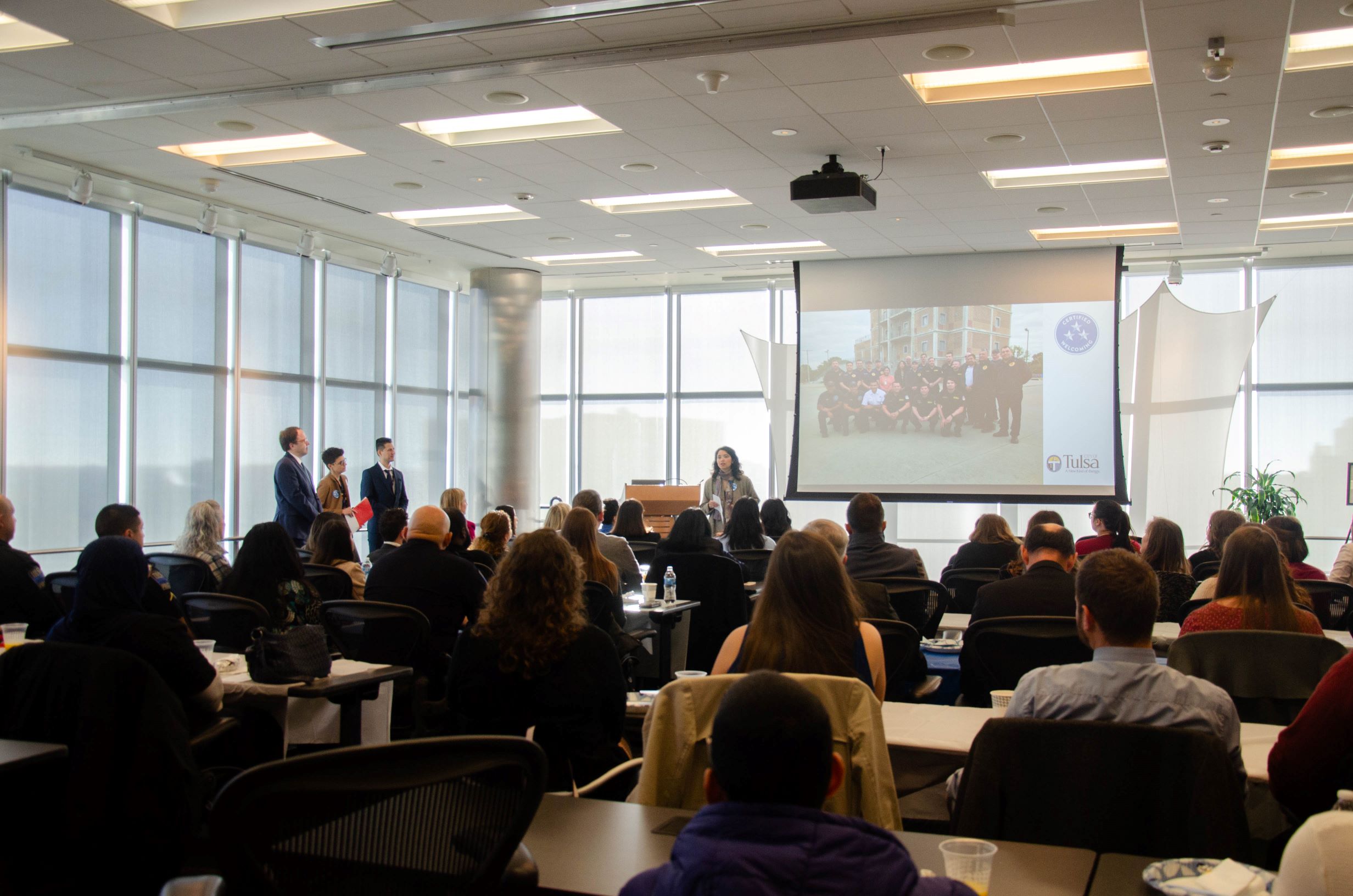
Building a world-class city: Tulsa excels in education and refugee resettlement
In November 2023, Tulsa became the first Certified Welcoming community in Oklahoma and the first place in the U.S. to achieve the 3-star designation. We interviewed team members from the City of Tulsa Mayor’s Office of Resilience and Equity to learn how they advanced their welcoming efforts as a result of Certified Welcoming and their plans for the future.
Tulsa is on a journey to build a more resilient city. With immigrants accounting for over 27 percent of population growth between 2010 and 2015, the city’s intentional investment in welcoming has helped them attract and resettle newcomers from all walks of life.
To get there, Mayor G.T. Bynum institutionalized equity work within the city government by establishing the Office of Resilience and Equity in 2018. With a staff of nine people, the office oversees the planning and execution of the Resilient Tulsa Strategy and New Tulsans Welcoming Plan, which includes strategies to attract newcomers.
“The resilience strategy has a racial equity lens, inclusion lens, and welcoming lens,” explains Krystal Reyes, the chief resilience officer in the Mayor’s Office of Resilience and Equity.
This multi-lens perspective is especially important given the city’s past. Over 100 years ago, the violence of the Tulsa Race Massacre left a mark that the community is still healing from. It’s one of the key reasons why the Resilient Tulsa Strategy prioritizes equity for Black and immigrant residents as an indicator that the city is becoming a more welcoming place.
“Tulsa applied to become Certified Welcoming to showcase what we have done so far,” says Nem Lun, the immigrant and refugee affairs manager at the City of Tulsa. “All of our partners have done such a wonderful job incorporating programs and resources to help make immigrants and refugees feel welcome here. This is a milestone to celebrate, but it’s not the end goal.”
Krystal emphasizes, “This certification puts us in line with other cities across the country. We’re able to see what we’re doing that is great and also things that we need to work on. It’s aligned with all our initiatives to make Tulsa a world-class city.”
Education supports newcomers’ civic, economic, and social opportunities
Tulsa has excelled in its commitment to provide education for immigrant job seekers. One particular initiative intersects the education and economic development frameworks of the Welcoming Standard: Flourish Tulsa. The program supports internationally trained immigrants to use their advanced degrees that were acquired abroad and recertify their credentials in the U.S.
“Tulsa has a lot of resources for the education of our immigrants and refugees,” says Nem. “I came to the United States in 2009. Compared to the resources that immigrants and refugees got in 2009 to 2023, it has improved a lot.”
By creating opportunities for newcomers to bring their expertise to the local job market, Nem and Krystal emphasized Flourish Tulsa’s importance in allowing immigrants to contribute to Tulsa’s workforce and build their families’ livelihoods.
The city’s work to improve education for newcomers was highlighted during the 2023 Certified Welcoming audit. Tulsa achieved all 17 education criteria in the Welcoming Standard, demonstrating that immigrants can access the education they need from early childhood to elementary and secondary education to higher ed and workforce development.
Partnerships and new initiatives raise the bar
Community partners like the George Kaiser Family Foundation have made an impact on economic development for newcomers. “They were able to raise money throughout the pandemic to help undocumented individuals access emergency funds,” says Krystal.
Furthermore, a team member at the community foundation has become a powerful advocate and partner for immigrant inclusion. According to Krystal, they support a place-based initiative in East Tulsa where a large immigrant community lives and have been a great partner in helping to build capacity among several immigrant-serving organizations.
During Tulsa’s audit, the city met all of the 1-star criteria in the Welcoming Standard, but the city was eager to take on some additional work to achieve certification at three stars. The team at the Mayor’s Office of Resilience and Equity launched several new partnerships and programs to fulfill all of the 3-star criteria:
- Voter education: The community recognized a need for voter education and civic engagement among new and aspiring American citizens in Tulsa. By incorporating voter education into existing classes that partners are leading, the city aims to empower immigrants to understand the significance of voting and democracy. “It may seem a little unnecessary for our longtime residents, but as an immigrant myself, voting wasn’t an option in our country,” Nem reflects. “Educating people on voting is an amazing milestone.”
- Cultural competency training for police: Patrol officers and non-patrol divisions of the Tulsa Police Department will participate in a new cultural competency training. The goal is to increase community safety and equip officers with practical skills for interacting with immigrants and refugees with limited English proficiency. “We’re letting them know about the diversity of the immigrant and refugee population here in Tulsa so that they’re aware of it,” says Nem.
Unifying the community through refugee resettlement
Bridges between immigrants, refugees, and U.S.-born residents can be built when everyone works together toward a common goal. “Everyone gets caught up in immigration politics or debates, but welcoming our immigrant and refugee communities is the most unifying thing that we do in Tulsa,” says Krystal.
In the community, welcoming refugees requires a network of organizations to ensure newcomers can access the resources they need. The City of Tulsa has a deep relationship with resettlement partners like Catholic Charities and agencies affiliated with HIAS.
“There’s a long history of working with resettlement agencies,” Krystal reflects. “We have to work in partnership and in ways that we can support, influence, and walk alongside everyone.”
According to Krystal, collaborating closely with the YWCA to manage refugee and asylee cases has strengthened racial equity in the community’s welcoming efforts. The community realized they needed a targeted approach to welcome over 900 Afghan refugees after the fall of Kabul, Afghanistan in 2021.
“When I looked at the previous census, we had maybe 10 people who identified as being from Afghanistan,” Krystal says. “Our [Afghan] community was scattered. We didn’t have a network like our other communities have.”
In the first year of Afghan resettlement, Tulsa’s community came together to meet the basic needs of Afghan newcomers like food, employment, and safe, stable housing.
“We got our partners together and put together a proposal,” she says. “We used those funds to support driver’s education classes, interpretation, contextualized English classes, and to cover the permit fees to help Afghan individuals get their driver’s licenses so they could get to work.”
The initiative not only addressed immediate challenges but also aimed to start a car loan fund as a long-term solution to transportation needs. In the third year since Afghan refugees began arriving the city, the community is now focused on helping Afghans settle long-term and feel a greater sense of belonging.
“Everyone gets caught up in immigration politics or debates, but welcoming our immigrant and refugee communities is the most unifying thing that we do in Tulsa.” — Krystal Reyes
Tulsa’s adaptability, collaboration, and investment in long-term welcoming infrastructure make the community more resilient to change and better prepared to welcome newcomers in a crisis.
Words of wisdom for becoming Certified Welcoming
Tulsa offers a wealth of lessons for communities that are interested in becoming Certified Welcoming.
For one, collaborative research and planning helped the city government develop a holistic strategy and prepare for certification. “We always work with community partners from the very beginning,” Krystal says. Over 100 people from across the community were involved in creating the New Tulsans Welcoming Plan.
Data drives the city’s strategy and has helped the broader community understand the importance of welcoming. “Our data shows our top three languages and our growing, diverse student community. Responding to the data is very helpful,” says Krystal.
For those considering certification or just building support for a welcoming initiative, Krystal advises, “Whether you’re on the inside or the outside of government, align the initiative with a strategy that’s already been accepted, vetted, voted on. There’s already community buy-in and that will go a long way.”

Krystal speaks to the audience at the Certified Welcoming reception in December 2023. Photo courtesy of the Tulsa Mayor’s Office of Resilience and Equity.
Since announcing their certification, Tulsa shared the results of their certification and the audit report publicly at a reception in early December 2023. They also recently hired an immigrant services liaison to continue to support the connection between the local government and immigrant communities and help immigrants find jobs that are aligned with their skills.
“We want to continue the work, not just for the sake of getting three stars,” Nem says. “We want to make sure that all of the work that we do aligns with our Resilient Tulsa Strategy and New Tulsans Initiative. In four years when we do recertification, I hope that we have done more than what we said we will do.”
In essence, Tulsa’s journey to becoming a more inclusive city is characterized by collaboration and a commitment to educating newcomers and the wider community. Their initiatives represent a broader movement of welcoming immigrants and building communities that everyone can call home.